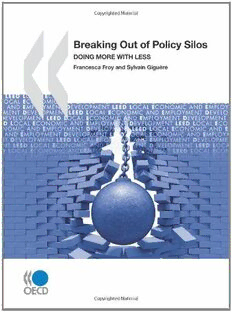
Breaking Out of Policy Silos: Doing More with Less PDF
140 Pages·2010·3.554 MB·English
Most books are stored in the elastic cloud where traffic is expensive. For this reason, we have a limit on daily download.
Preview Breaking Out of Policy Silos: Doing More with Less
Description:
In the context of the economic recovery and public budget cuts, policy silos and fragmented short-term policy interventions have become luxuries that our economies can no longer afford. Government intervenes in a myriad of ways at the local level, and rarely are these interventions co-ordinated effectively. Most of us are familiar with policy silos. Such divisions are often taken for granted, blamed on historical working relationships (it has always been like that) and organisational cultures (they dont work like we do). However these divisions come at a cost. The issues and challenges facing local communities are often complex, and require a holistic approach to be resolved. This book provides concrete advice to policy makers at both national and local levels on how to better align policies, reduce duplication and waste, and do more with less. It is based on comparative analysis of 11 countries in Australisia, Europe and North America and combines rankings on where countries stand in terms of the integration of employment, skills and economic development policies, with concrete examples of successful policy integration on the ground. Table of Content : AcknowledgementsExecutive summaryPart I. Synthesis of Country Findings-Why integrate policies?-The extent of local policy integration in the countries studied-What factors influence policy integration at the local level?-Co-operation at national level-Local co-operation-Flexibility-Capacities-Labour market conditions-Conclusions and recommendations-Areas for consideration by country-Bibliography-Annex A. The study team-Annex B. The case study regionsPart II. Country Synopses-Bulgaria-Canada -Croatia -Denmark -Greece -Italy -New Zealand -Poland -Portugal -Romania -United States -About the authors
See more
The list of books you might like
Most books are stored in the elastic cloud where traffic is expensive. For this reason, we have a limit on daily download.
